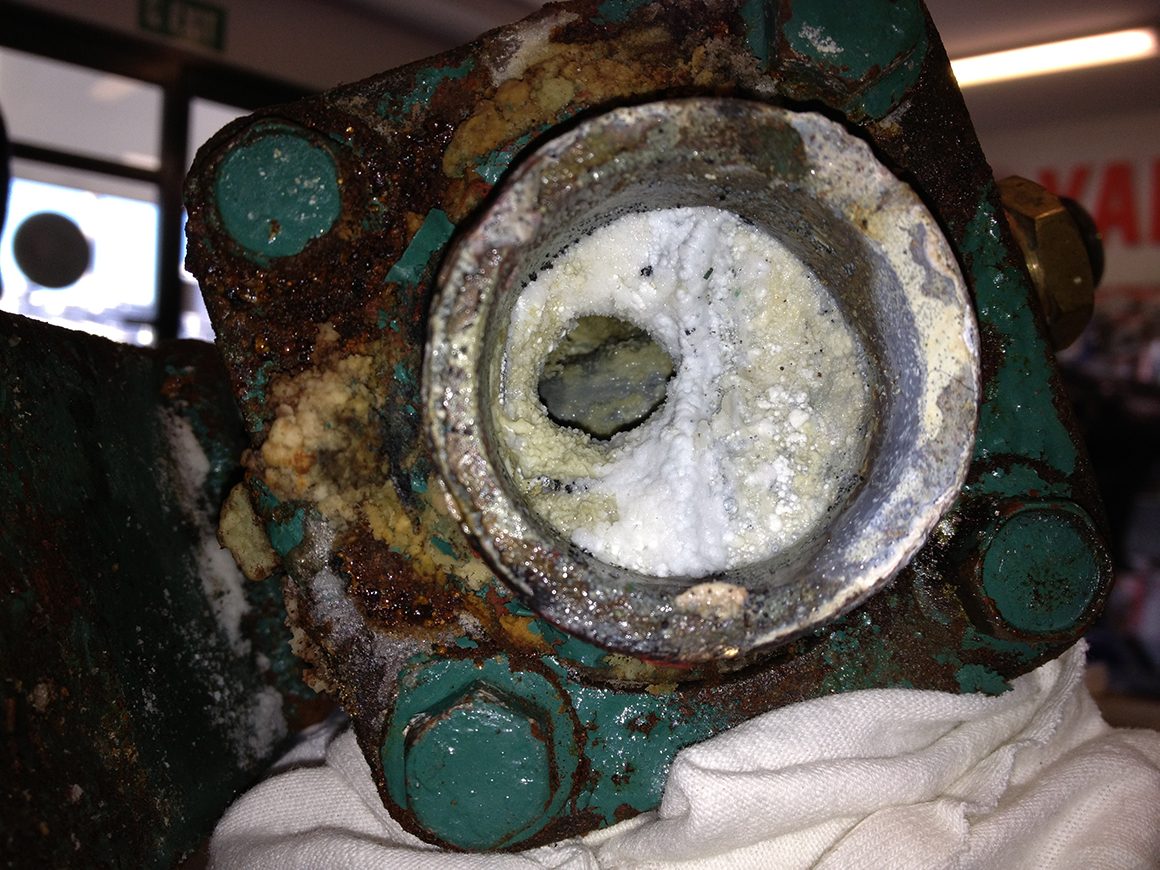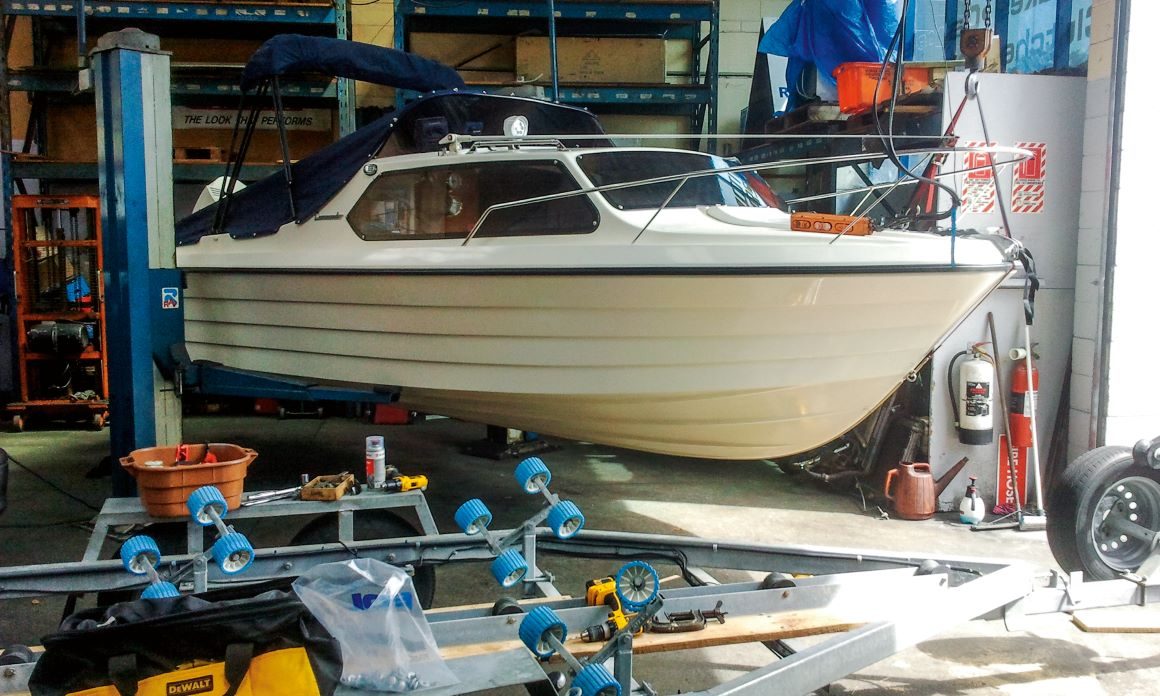

Keep your engine running at the right temperature to avoid major damage and you won’t need to get hot under your collar, writes Lawrence Schaffler.
major cause of corrosion in your diesel’s cooling system is often an unexpected culprit – the engine coolant. Coolants degrade and lose their anti-corrosion potency over time. To keep your engine at a happy temperature, change its coolant regularly.
Lachlan Trembath, the sales director at Auckland’s Ovlov Marine, pulls no punches about what he calls the pervasive problem with boat owners and cooling system maintenance. “I will wager that about half of the boats lying at any marina have glycol in their cooling systems that’s well past its use-by date,” he says.

A great proportion of cooling system issues, he says, can be traced to coolant that’s lost its anti-corrosive properties. “Most boat owners are aware that they should use glycol rather than fresh water, but they rarely consider that glycol – in addition to its anti-freeze properties – also contains anti-corrosive components.
“These, unfortunately, degrade over time. So while the coolant keeps the engine running at the right temperature, there is no protection against corrosion. Eventually one or more components fail, and the repair bill can often be expensive.”

The frequency at which the glycol should be changed, adds Julian Parbury, owner of Christchurch’s Heat Exchanger Services (Heatex), is usually specified by the coolant manufacturers rather than the engine manufacturers. “It’s usually between two and five years, and be aware that not all engines use the same glycol – you need the one specified by the engine manufacturer.”
Boats that lie unused for lengthy periods, says Trembath, become particularly vulnerable to old-glycol syndrome and cooling system failure.
“When an engine is inoperative, the glycol and raw sea water sit in the cooling system and, without anti-corrosive protection, large deposits of calcification occur. When the engine’s fired up after a few months, those deposits often break loose and clog the tubes in the heat exchanger. And as everyone knows – blockages quickly cause overheating, with potentially severe damage to the engine.”
Another problem with calcification build-up is that it forms a kind of insulation, preventing the heat exchanger from doing its job. Similarly, degraded glycol often forms a sludgy, brown film on the tubes of the heat exchanger. It, too, acts as insulation, resulting in an over-heated engine.

“Oil is an engine’s life-blood and when it overheats it starts to break down. Poor lubrication can cause major engine damage,” says Trembath. “That not only means an expensive repair bill but it could also create a potentially dangerous situation if the engine stops. Chances are it will be at the worst possible time.”
The bottom line? If you can’t remember when your engine’s glycol was last changed, the job’s probably overdue. You can, however, have the glycol tested to check its condition. Companies like Ovlov use a refractometer for the test. It analyses the ratio of the anti-corrosive concentrate in the glycol. Note that adding fresh water to the cooling system simply dilutes the concentrate. Always carry a spare container of glycol on board.
Galvanic Corrosion
Cooling systems are also vulnerable to galvanic corrosion, a different process which can also cause parts of your engine to deteriorate, sometimes with catastrophic results. Identifying the causes of galvanic corrosion is a black art. It’s a complicated problem which we’ve explored in previous issues of Boating New Zealand.
It refers to the flow of electrons that occurs when two dissimilar metals are brought into contact, leading to the depletion of one of the metals. The electron flow accelerates dramatically when a conductor like sea water is involved.
Marine diesel cooling systems carry plenty of different metals and alloys, including copper, nickel, aluminium, iron and steel. It’s virtually impossible to stop galvanic corrosion, but you can retard it by regularly inspecting and replacing the cooling system’s zinc anodes. There is typically one in every heat exchanger or oil-cooler.

The problem is often exacerbated by stray current – a different but associated issue. It’s caused by poor electrical wiring. It doesn’t usually affect modern vessels with well-designed electrical systems but it’s often prevalent in older boats because of the dodgy wiring used when new electronics are added.
If your anodes are being eaten away a lot faster than you would expect, it may be that you have stray current in your boat. Or, it might not be your boat that’s the problem – rather it’s the boat lying alongside.
If you suspect your boat is being attacked by current from other vessels moored nearby, you might consider a location test. Ovlov provides this service, and Trembath says it involves two electrodes being hung in the water at either end of the boat, to measure any electrical current flowing in the area.
Erosion
Another kind of corrosion that’s evident in marine diesel cooling systems, says Parbury, is actually erosion, caused by sea water that scours the insides of the cooling system because the velocity is too great. It’s usually caused by a restriction in one part of the system, and to get the same volume of water though the remaining, unrestricted passages, it speeds up.
“It’s particularly dangerous when the raw water strainer on the hull fitting isn’t doing its job, and sand and grit get sucked into the system,” says Trembath. “The copper-nickel tubes inside the heat exchanger are usually the first to go.”
A final point: don’t remove the cooling system’s thermostat in a bid to keep the engine running at the right temperature. Yes, thermostats can malfunction, but if the engine’s running hot, it’s probably due to a fault elsewhere in the cooling system.
Diesels should run at their normal operating temperature. Just as overheating is bad for an engine, so is running too cold. It can create a litany of problems such as incomplete combustion, more sulphur in the cylinders and oil, and poor performance.
Fighting cooling system corrosion is tricky because you can’t always see the enemy. But you can improve the odds by refreshing the coolant regularly.




